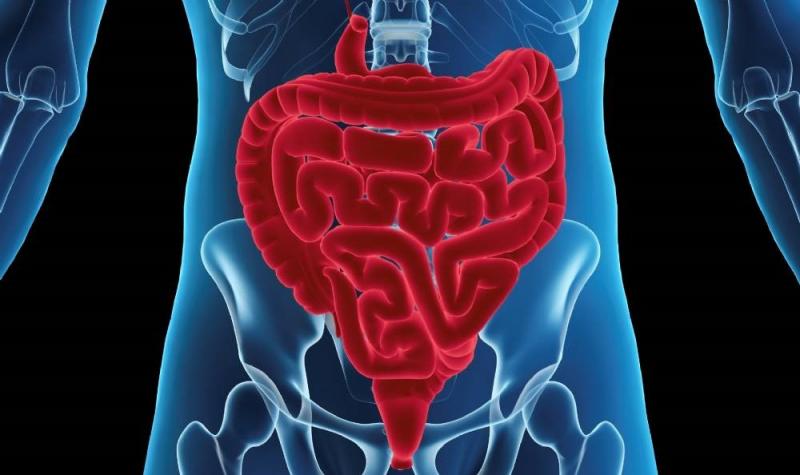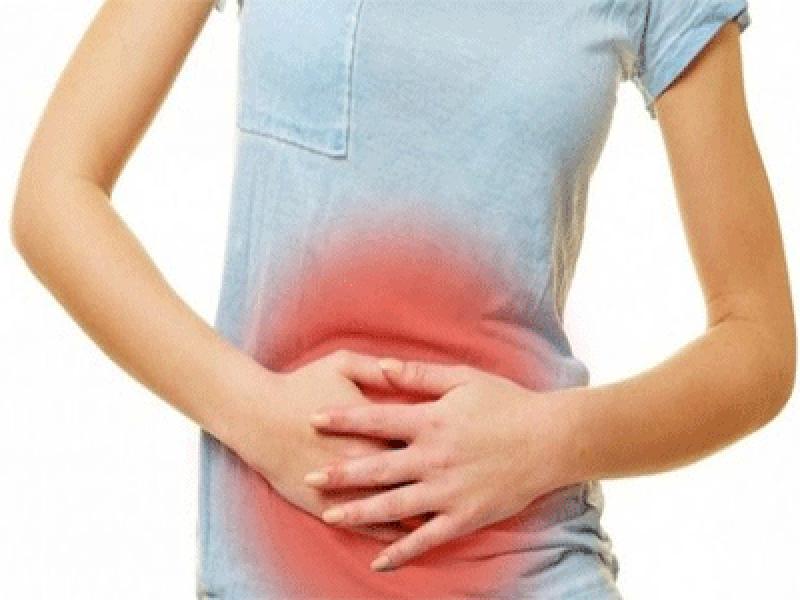Inflammatory bowel disease (IBD) is an umbrella term used to describe disorders involving chronic inflammation of our digestive tract. Types of inflammatory bowel disease include:
• Ulcerative colitis: A disease that causes long-term inflammation and injuries (ulcers) in the innermost layer of the large intestine (colon) and rectum.
• Crohn’s disease: Crohn’s disease is an inflammatory disease that can involve the entire digestive system from mouth to anus. The difference from ulcerative colitis is that it can hold the stomach and small intestines outside the colon and affect all layers at the same time.
Sometimes it is not possible to distinguish between these two diseases, this is called mixed (mixed type) inflammatory bowel disease.
Both ulcerative colitis and Crohn’s disease often include severe diarrhea, abdominal pain, fatigue, and weight loss. Inflammatory bowel disease can be debilitating and sometimes cause life-threatening complications.
Symptoms
The symptoms of inflammatory bowel disease vary depending on the severity of inflammation and where it occurs. Symptoms may be mild or severe. You may have periods of active illness followed by periods of remission. Signs and symptoms common to both Crohn’s disease and ulcerative colitis are:
• Diarrhea
• Fever and weakness
• Abdominal pain and cramping
• Blood in stool
• Decreased appetite
• Undesirable weight loss

When should you see a doctor?
You should consult your doctor if you experience a permanent change in your bowel habits or if you have any of the signs and symptoms of inflammatory bowel disease. Inflammatory bowel disease is usually not fatal, but in some cases it is a serious disease that can cause life-threatening complications.
Causes;
The exact cause of inflammatory bowel disease is unknown. Previously, diet and stress have been suspected. The possible cause is deterioration of the immune system. When your immune system tries to fight a virus or bacteria, it attacks the digestive tract as well as microbial agents, giving an abnormal immune response, and inflammation occurs. Inheritance (genetic) causes inflammatory bowel disease to be more common. However, most people with inflammatory bowel disease do not have this family history.
Inflammatory bowel disease is not celiac disease. Celiac disease is another condition with similar symptoms to inflammatory bowel disease. However, the cause of celiac disease is known and very specific. It is an inflammatory response to gluten (a group of proteins found in wheat and similar grains). Symptoms of celiac disease disappear after starting a gluten-free diet.
Risk factors;
• Age: Most people with inflammatory bowel disease are diagnosed before the age of 30. However, in some people, it may occur in the 50s or 60s.
• Race or ethnicity: Whites have the highest risk of disease. If you are of Ashkenazi Jewish origin, your risk is even higher.
• Family history: If you have a close relative such as a parent, sibling or child, you are at high risk.
Smoking is the most important controllable risk factor for Crohn’s disease. Although smoking provides some protection against ulcerative colitis, quitting smoking is important for general health.
• Non-steroidal anti-inflammatory drugs (painkillers): ibuprofen naproxen sodium, diclofenac sodium (Voltaren) and others. These drugs may increase the risk of developing IBD or worse disease in people with IBD.
• Place of residence: If you live in an industrialized country, you are more likely to develop inflammatory bowel disease. Therefore, environmental factors, including a high diet in fat or refined foods, may play a role. People living in northern climates also seem to be at greater risk.
Complications:
Ulcerative colitis and Crohn’s disease have some common complications and diseases specific to each disease. Complications found in both cases may include:
• Colon cancer: Having ulcerative colitis and Crohn’s disease increases your risk of colon cancer. General colon cancer screening guidelines for people without these diseases call for colonoscopy every 5 years starting at age 45. However, patients with Crohn’s disease and ulcerative colitis should be screened for cancer after 8 years, preferably by advanced endoscopy.
• Skin, eye and joint inflammation: Some disorders such as arthritis, skin lesions and eye inflammation (uveitis) may occur in the flares of ulcerative colitis and Crohn’s disease.
• Drug side effects: Certain medications for ulcerative colitis and Crohn’s disease can very rarely lead to the development of some cancers. You should therefore be closely monitored by your doctor when using these medications. Corticosteroids may also be associated with increased risk of osteoporosis, high blood pressure and other conditions.
• Primary sclerosing cholangitis: In this case, inflammation causes deterioration of the bile ducts, eventually narrowing them and gradually causing liver damage.
• Blood clotting and vascular problems In ulcerative colitis and Crohn’s disease, blood clotting in the arteries and veins may occur at a rate of 19%.

Complications of Crohn’s disease may include;
• Intestinal obstruction: Crohn’s disease affects the exact thickness of the intestinal wall. Over time, intestinal portions may become thicker and narrower, which may interfere with the flow of digestive content. Surgery may be necessary to remove the diseased portion of your bowel.
• Malnutrition: Diarrhea, abdominal pain, and cramping can make it difficult for you to feed or absorb enough of your intestines to feed you. In addition, anemia may occur due to low iron or disease-induced vitamin B12.
• Ulcer: Chronic inflammation can cause open sores (ulcers) anywhere in your digestive system, including your mouth and anus, and in the genital area (perineum).
• Fistulas: Sometimes ulcers may extend completely along the intestinal wall and form a fistula (an abnormal connection between different body parts). Fistulas (perianal) near or around the anal area are the most common species. In some cases, a fistula may be infected and an abscess may occur.
• Anal crack: This crack occurs around the anus. It is usually associated with painful defecation and may cause perianal fistulas.
Complications of ulcerative colitis may include:
• Toxic megacolon: Ulcerative colitis can cause the colon to expand and swell rapidly, a serious condition known as toxic megacolon.
• Colon perforation: Puncture in the colon is most often caused by toxic megacolon, and sometimes occurs spontaneously. Severe dehydration (loss of water). Excess diarrhea can cause dehydration.
Inflammatory Bowel Disease – Diagnosis
Your doctor will be able to diagnose inflammatory bowel disease only after you have ignored other possible causes for your symptoms and symptoms. You may have one or more of the following tests and procedures to help confirm the diagnosis of inflammatory bowel disease.
Blood and feces tests: Blood tests can show if there is burning in your body and if you are anemic. They can also show you whether you’re getting the right vitamins and minerals, and check that organs like your liver and kidneys are working properly. It is used for diagnosis in endoscopy, x-ray or screening.
Endoscopic Procedures
• Colonoscopy: This examination allows your doctor to see your entire colon using a thin, flexible, lighted tube connected to the camera. During the procedure, your doctor may also take small tissue samples for laboratory analysis (biopsy). Sometimes a tissue sample can help confirm the diagnosis.
• Flexible sigmoidoscopy: Your doctor uses a thin, flexible, lighted tube to examine the last part of your colon, the rectum and sigmoid. If your colon becomes severely inflamed, your doctor may perform this test instead of a full colonoscopy.
• Upper endoscopy: In this procedure, your doctor uses a thin, flexible, light tube to examine the first part of the esophagus, stomach, and duodenum. While these areas are rarely involved in Crohn’s disease, this test may be recommended if you experience nausea and vomiting, difficulty eating, or upper abdominal pain.
• Capsule endoscopy: This test is sometimes used to help diagnose Crohn’s disease involving your small intestine. You swallow a capsule with a camera in it. The images are transferred to a recording device that you use on your belt, after which the capsule exits painlessly in your body. You may need endoscopy with a biopsy to confirm the diagnosis of Crohn’s disease.
• Balloon assisted enteroscopy: For this test, the scope is used with an instrument called an overtube. This allows the doctor to look further into the small intestine that standard endoscopes cannot reach. This technique is useful when capsule endoscopy shows abnormalities.
Scanning procedures
• X-ray: If you have severe symptoms, your doctor may use a standard x-ray in your abdomen to exclude serious complications such as a perforated colon.
• Computed tomography (CT) scan: You may have a CT scan – a special X-ray technique that provides more detail than a standard X-ray. This test looks at tissues in and out of the intestine. CT enterography is a special CT scan that provides better images in the small intestine. This test replaces barium X-rays in many medical centers.
• Magnetic resonance imaging (MRI): An MRI scanner uses a magnetic field and radio waves to generate detailed images of organs and tissues. An MRI is particularly useful for assessing fistula around the anal region (pelvic MRI) or small intestine (MR enterography). Unlike CT, there is no radiation exposure by MRI.
Treatment
The aim of treatment of inflammatory bowel disease is to reduce inflammation that triggers your signs and symptoms. In the best cases, this can not only alleviate symptoms but also lead to long-term remission and reduced risk of complications. IBD treatment usually involves drug therapy or surgery.
• Anti-inflammatory drugs: Anti-inflammatory drugs are the first step in the treatment of inflammatory bowel disease. Anti-inflammatory agents include drugs such as mesalamine, balsalazide and olsalazine, corticosteroids and aminosalicylates. Which medication you take depends on the region affected by your colon.
• Immune system suppressors: These drugs suppress the immune system to eliminate inflammation. For some people, a combination of these drugs gives better results than a drug alone.
Surgical procedure
If your diet and lifestyle changes, medication or other treatments do not relieve your IBD signs and symptoms, your doctor may recommend surgery.
• Ulcerative colitis surgery: Surgery can often eliminate ulcerative colitis. However, this usually means removing the entire colon and rectum (proctocolectomy). In most cases, this includes an ileal pouch, a procedure called anal anastomosis. This procedure eliminates the need to attach a bag to collect feces. Your surgeon builds a sac from the end of your small intestine. The bag is then attached directly to your anus, allowing you to dispose of waste normally. In some cases a pouch is not possible. Instead, surgeons create a permanent opening in your abdomen (ileal stoma) as they pass to collect in a bag attached to the stool.
• Surgery for Crohn’s disease: Up to half of people with Crohn’s disease will need at least one surgery. However, surgery does not cure Crohn’s disease. During surgery, your surgeon removes a damaged part of your digestive tract and then reconnects the healthy parts. Surgery can also be used to close the fistula and drain the abscess. The benefits of surgery for Crohn’s disease are usually temporary. The disease is often recurred near the reconnected tissue. The best approach is to follow the drug surgery to minimize the risk of recurrence.